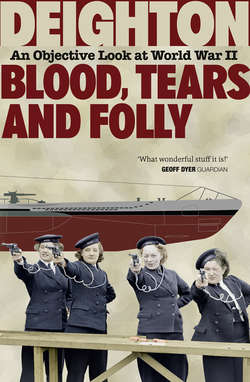Читать книгу Blood, Tears and Folly: An Objective Look at World War II - Len Deighton - Страница 13
Churchill – first lord of the Admiralty
ОглавлениеIn 1911, when the 36-year-old Winston Churchill was appointed first lord of the Admiralty (the minister responsible for the Royal Navy), he was appalled to find his Whitehall offices deserted, and ordered that there be always officers on duty. On the wall behind his desk he put a case, with folding doors which opened to reveal a map on which the positions of the German fleet were constantly updated. Churchill started each day with a study of that map.
Churchill revolutionized the navy. His principal adviser was the controversial Sir John Arbuthnot Fisher, who predicted with astounding accuracy that war against Germany would begin on 21 October 1914 (when widening of the Kiel Canal for the new German battleships was due to be completed). The Royal Navy did not welcome Churchill’s ideas. When he wanted to create a naval war staff, they told him they did not want a special class of officer professing to be more brainy than the rest. One naval historian summed up the attitude of the admirals: ‘cleverness was middle class or Bohemian, and engines were for the lower orders’.7
Churchill forced his reforms upon the navy. He created the Royal Naval Air Service. Even more importantly, he changed the navy’s filthy coal-burning ships, with their time-consuming bunkering procedures, to the quick convenience of oil-burning vessels with 40 per cent more fuel endurance. As industry in Britain was built upon coal but had no access to oil, this entailed creating an oil company – British Petroleum – and extensive storage facilities for the imported oil. He ordered five 25-knot oil-burning battleships – Queen Elizabeth, Warspite, Barham, Valiant and Malaya – and equipped them with the world’s first 15-inch guns. Normally a prototype for such a gun would have been built and tested, but rather than waste a year or more, Churchill put the guns straight into production so that the ships could be ready as soon as possible.
Britain’s need for naval alliances had dragged her into making an agreement with France that should war come Britain would send an army to help defend her. This was a dramatic change in Britain’s centuries-old policy of staying out of mainland Europe. Cautious voices pointed out that no matter what such an expeditionary force might achieve in France, Britain remained vulnerable to foreign fleets. It was a small offshore island dependent upon imported food, seaborne trade and now oil from faraway countries instead of home-produced coal. The extensive British Empire was still largely controlled by bureaucrats in London. Defeated at sea, Britain would be severed from its Empire, impoverished and starved into submission.
